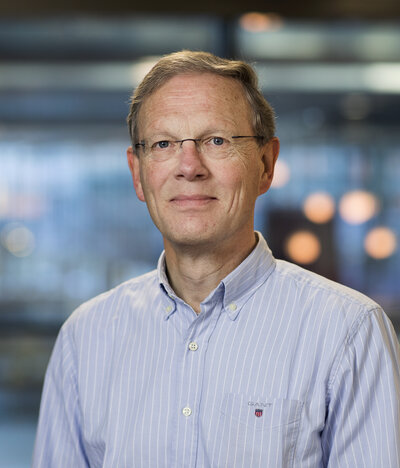Gerard de Haan
Department / Institute

RESEARCH PROFILE
Gerard de Haan is Professor of Electronic Systems within the Department of Electrical Engineering at Eindhoven University of Technology (TU/e).
His research field is video signal processing in a broad sense. Application areas include multimedia systems and video health monitoring. The general goal of the processing is signal enhancement to improve the image quality and accurate sensing of vital signals amidst strong artifacts, with topics including: noise and artifact reduction, video format conversion, displayspecific processing, and enabling technologies such as motion estimation and object detection.
De Haan’s research has been documented in 4 books and 3 book chapters, about 200 papers and more than 200 patent applications, and it has resulted in various commercially available ICs. De Haan serves on the program committees of various international conferences on image/video processing and analysis and has been a guest editor for special issues of Elsevier, IEEE, and Springer.
Both the function and the implementation determine the resulting video processing algorithm, and ideally they should be designed together.”
ACADEMIC BACKGROUND
Gerard de Haan received his BSc (cum laude), MSc (cum laude), and PhD degrees from Delft University of Technology in 1977, 1979 and 1992, respectively. He joined Philips Research in 1979 to lead research projects in the area of video processing and analysis. From 1988 to 2007, he taught post-academic courses for the Philips Center for Technical Training at various locations in Europe, Asia and the United States.
In 2000, he was appointed Fellow in the Video Processing & Analysis group of Philips Research Eindhoven, and Full Professor at Eindhoven University of Technology (TU/e).
Key Publications
-
R.A.C. Braspenning,G. Haan, de
True-motion estimation using feature correspondence
(2004) -
G. Haan, de,V. Jeanne
Robust pulse-rate from chrominance-based rPPG.
IEEE Transactions on Biomedical Engineering (2013) -
G. Haan, de,A.J. Leest, van
Improved motion robustness of remote-PPG by using the blood volume pulse signature
Physiological Measurement (2014) -
M.J.H. van Gastel,S. Stuijk,G. de Haan
New principle for measuring arterial blood oxygenation, enabling motion-robust remote monitoring
Scientific Reports (2016)
Ancillary Activities
No ancillary activities